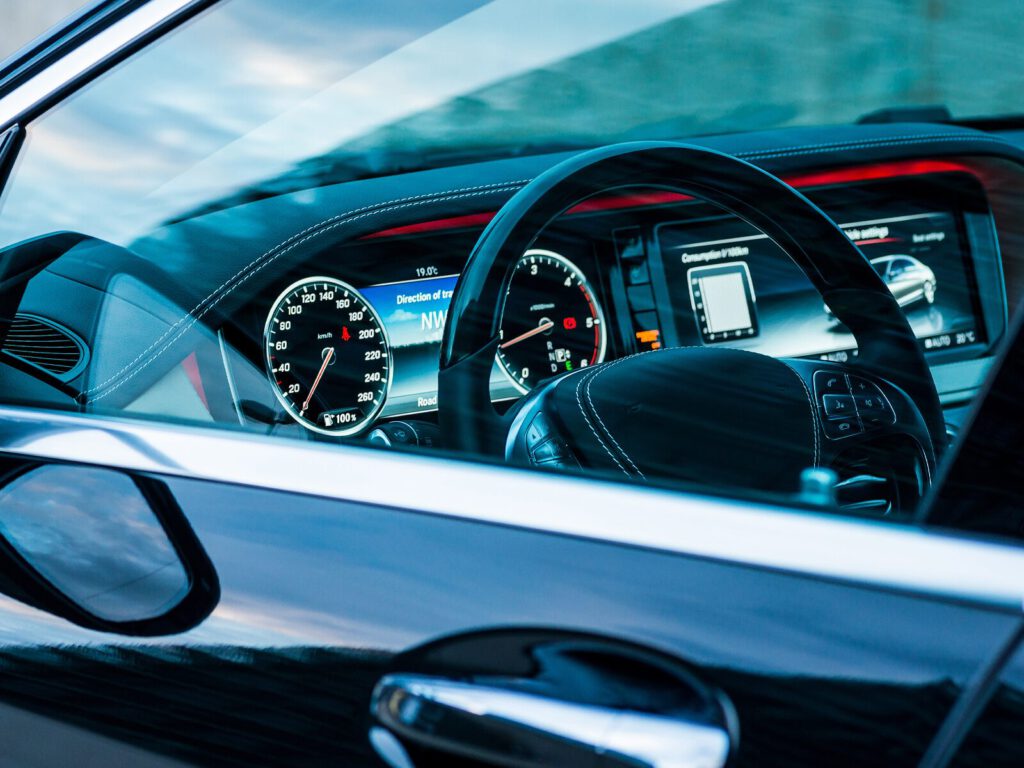Applied Technical Services performs DIN 75201 standard testing for clients looking to determine the fogging characteristics of specific interior materials in motor vehicles.
Fogging occurs when high interior temperatures cause volatile and semi-volatile compounds (VOCs and SVOCs) inside a vehicle to condense onto cooler glass surfaces such as the windshield, severely reducing outward visibility. DIN standard 75201 is a method developed by the German Institute for Standardization that enables vehicle material manufacturers to test the level of condensing and/or evaporation of volatile compounds.
DIN 75201 Test Methods
ATS conducts two relevant testing methods when performing DIN 75201, the reflectometric method and the gravimetric method.
Reflectometric Method
In the reflectometric method, a sample material is placed in a beaker and covered with a glass plate before being heated to a temperature of 100 degrees Celsius for three hours. The glass plate is simultaneously cooled to 21 degrees, allowing the SVOC gasses to condense on the glass. The Reflective Index of the fogged plate is then calculated and recorded.
Gravimetric Method
The gravimetric method is performed by placing the test subject in a beaker and covering it with an aluminum foil disk. The material is heated at 100 degrees Celsius for 16 hours, while the aluminum disk is cooled to maintain a temperature of 21 degrees. The released SVOC gasses condense on the cooler disk, and the total amount of fogging condensate collected can be measured at the end of the 16 hours.
Both the reflectometric and gravimetric DIN methods are highly useful for clients looking to efficiently verify that the fogging values of a specific material meet the given manufacturing standards or OEM requirements.
Testing Capabilities
ATS performs all DIN 75201 standard testing in our ISO/IEC 17025:2017 (A2LA) accredited automotive testing labs. Our experienced personnel use specialized equipment to accurately evaluate the fogging characteristics of materials such as plastic articles, leather, textiles, adhesives, and thermoplastic elastomers.
We also perform fogging tests following the various standards based on DIN 75201, including:
- Ford – SAE J 1756
- GM – GMW 3235
- Toyota – TSM 0503 G (Limited to Method B)
- Volkswagen – PV 3015
- Volvo – VCS 1027, 2719
Applied Technical Services – A Reliable Testing Provider
Since 1967, ATS has successfully uncovered facts in Materials Testing, Chemical Analysis, Nondestructive Testing, Forensic Investigations, Metallurgy, and Calibration Services. ATS serves clients in a variety of industries in both national and global markets, including clients in the fields of aerospace, automotive, chemical, consumer products, healthcare, insurance, and manufacturing.
ATS Labs and Lab Experts Deliver Quality Assurance
All our field and lab technicians work under the ATS Quality System, which is compliant with the various established quality system standards for the industries we serve. Our certified experts include chemists, metallurgists, investigators, scientists, Professional Engineers of various disciplines, and well-trained technicians. ATS’ accreditations and certifications include ISO 17025, ISO 9001:2015-2015, Nadcap, and recognition as an FAA Repair Station.
ATS is committed to the following policies:
- Employ Qualified and Engaged Employees
- Conduct Testing and Inspections Following Applicable Standards
- Provide Clear and Accurate Data
- Deliver All Professional Services in A Timely Manner



